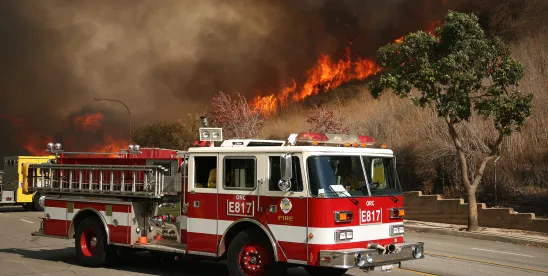Wildfires continue to rage across Southern California, leveling entire neighborhoods, forcing evacuations for tens of thousands of people, and posing incredible hardship on businesses and their employees. Below are a few common scenarios employers should know about paying their California employees and maintaining compliance with wage and hour laws:
“Our office was closed for a few days because of the fires. Do we have to pay our employees for those days?”
Non-exempt (i.e., overtime-eligible) employees generally have to be paid only for hours they actually work. So, if a non-exempt employee cannot work because your office is closed—or because the employee cannot make it into the office because of natural disaster-related conditions—the wage and hour laws do not require you to pay the employee for non-working time. On the other hand, a non-exempt employee who performs work remotely (say, from home, from a temporary site, or from a coffee shop) is entitled to pay for the time worked.
An exception exists for salaried non-exempt employees, who may—depending on the terms of their agreement with the employer—expect to receive their full weekly salary regardless of how many hours they actually work that week.
Exempt employees (i.e., employees not entitled to overtime pay) generally receive their full salary for any week in which the office is closed for less than a full workweek. If your office is closed for an entire workweek, you can inform all employees of the closure and you need not pay them for that week (unless they are working remotely).
Be sure to check any agreements with exempt employees—as well as offer letters, policies, or other statements regarding the nature of their pay—which may also limit your ability to prorate salary during office closures and/or give rise to pay claims.
“Because of dangerous conditions, we had to close our office after a number of employees had already reported for work. Do we have to pay them for the day?”
Exempt employees who report to work but are turned away or sent home by their employer generally must receive their salary for that week.
Non-exempt employees are often entitled to reporting time pay when they show up for their shift and are sent home before they’ve worked at least half their shift. But there is an exception for certain conditions that are beyond the employer’s control, including natural disasters like wildfires.
If the business closes at an employer’s discretion, and not due to a threat to property, recommendation by civil authority, failure of public utilities, or work interruption by an “act of God,” reporting time pay may be owed. When a nonexempt employee shows up for work as scheduled and is not put to work or is given less than half of their scheduled hours, the employee is eligible for reporting time pay equal to one-half of the scheduled shift, but no less than two hours and no more than four hours.
“Our office was open, but some of our staff could not make it in because of the fires. Do we need to pay them?
As we note above, non-exempt employees generally must be paid only for hours they actually work, but salaried non-exempt employees may have a right to receive their full salary for any week in which they perform work.
Exempt employees who are absent from work for one or more full days because of transportation difficulties are considered to be absent for personal reasons if the office is otherwise open. Absent a contractual right to be paid, they do not have to be paid for the days they are unable to report to work, and the employer does not jeopardize their exempt status if it decides not to pay them for those days. Deductions for partial-day absences under these circumstances, however, are not permitted.
“Can employees refuse to work if our worksite is an evacuation zone?”
Yes. California law prohibits employers from retaliating against workers who refuse to work in unsafe conditions, including when their worksite is an evacuation zone. Employers should check local evacuation orders before reopening worksites and communicate clearly with employees about when it is safe to return.
“Our payroll records were destroyed in the fires or are inaccessible. How do we pay our employees?”
If the only records of hours worked are lost or unusable, then there is no perfect solution. Recreate the most-accurate accounting you can under the circumstances. Use a reasonable method to determine the number of hours worked, such as:
- Asking employees to submit a certified time sheet indicating the number of hours they worked;
- Re-creating hours worked through electronic records (e.g., card/ID swipes or logins/logouts);
- Making assumptions based on an employee’s fixed or regular schedule of hours;
- Asking managers to verify hours worked; or
- Some combination of the above.
“How do we record employees’ worktime without our electronic time clocks?”
Employees may record all hours worked on physical or handwritten timesheets. Employees should be instructed to enter their own time and to record the actual times when their work starts and stops each workday, including meal breaks.
“Can we require our employees to use available sick time or vacation days during a fire or natural disaster-related office closure or absence?”
Employees may use accrued sick leave under California law for absences related to the wildfire disaster if the need falls under a permissible use (such as health issues or to care for a family member). Additionally, the employee may choose to take paid leave under vacation or paid time off policy if the policy provides for such leave or the employer opts to allow, but this generally cannot be required unless reasonable notice is provided and stated in a policy or employment agreement.
“Can we give our staff additional paid or unpaid time off to assist in recovery or relief efforts?”
Yes. Employers may grant their employees additional paid and unpaid time off for any reason, including assisting with disaster-related recovery and relief efforts.
All employers must also provide leaves of absence for employees who serve as volunteers for local fire departments or other emergency response entities but are not required to compensate the employees during this time off. Employees who are assisting in relief efforts as part of the National Guard or Armed Forces Reserves may have additional rights under state and federal law.
“Because of the fires, it took our employees twice as long to commute to work as opposed to most other days. Do we need to pay them for the additional commute time?”
Generally, time spent in an employee’s normal commute from home to work at the beginning of the workday, and from work to home at the end of the workday, is not considered time worked and need not be paid. However, commute time is considered compensable work hours where the employer requires its employees to meet at a designated place, use the employer’s transportation to and from the work site, and prohibits employees from using their own transportation.
“Some of my employees are members of a union. Do these rules apply to them as well?”
Collective bargaining agreements generally cannot waive or reduce the protections available to employees under federal, state, or local wage and hour laws. However, collective bargaining agreements can—and often do—impose additional pay, time off, and other obligations on employers. Employers with unionized employees should consider all applicable agreements when analyzing their rights and responsibilities in the context of a natural disaster-related emergency or other “force majeure” event.
“We want to do more for our employees, to go above and beyond what the law requires. What are some things we can do?”
Employers that want to do more for their employees may consider the following:
- Granting additional paid or unpaid time off;
- Allowing affected employees to work remotely for some period of time;
- Making loans or emergency advances of wages;
- Setting up disaster-relief programs or payments;
- Setting up food and clothing drives.
Final Thoughts
Employers making decisions about scheduling, pay, and time off during natural disaster-related emergencies and disruptions should bear in mind the potential implications on employee morale. Flexibility and support in times of need—or the absence of them—are likely to be remembered long after the fires are extinguished.



 />i
/>i
